
Placeholders – The Second
/
0 Comments
The unification of templates, concepts, and placeholders goes on. This time, I will look closely at constrained…

Concepts – Placeholders
C++11 has auto unconstrained placeholders. You can use concepts in C++20 as constrained placeholders.…

Expression Templates
Expression templates are "structures representing a computation at compile-time, which are evaluated…

C++ is Lazy: CRTP
In my previous post, Recursion, List Manipulation, and Lazy Evaluation, I wrote about the characteristics…

Monads in C++
Monads in C++? What a strange name for a post. But it's not so strange. With std::optional, C++17 gets…

Concepts
We stay in the year 2020. With high probability, we will get concepts. Of course, waterproof statements…

The New Ranges Library
A small-time jump, and we are in the year 2020. C++ will get - as far as the future is predictable -…

Fold Expressions
With fold expressions, you can implement Haskell functions foldl, foldr, foldl1, and foldr1 directly…

Recursion, List Manipulation, and Lazy Evaluation
The remaining three characteristics of functional programming are told quite quickly: Recursion, manipulation…

Pure Functions
Pure functions are pretty similar to mathematical functions. They are the reason that Haskell is called…
